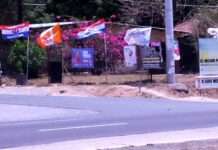
Law wars: privileges, immunities and exceptions
by Eric Jackson
Do we actually have the rule of law in Panama? Many deny it and most who know anything about the subject note our legal system’s serious shortcomings. Now come three significant tests that will again raise that subject.
Since the end of the Martinelli administration, the dozens of legal cases arising from its many aspects of corruption — the ex-president alone currently faces 15 separate criminal cases in the Supreme Court — have mostly not come to the point of trials based on the facts of those matters. Mostly they have been about who has what sort of immunity and whether it can be lifted or cicumvented, or which infomation is privileged and unavailable to the courts of law, or what exceptions to the general rule of law and who the beneficiaries of such disparate treatment may be.
Is it some sort of shell game, with a figurative pea under a figurative walnut shell that’s being rapidly and erratically shuttled around among other shells? But now mallets are being drawn and shells and peas may be crushed. (Figuratively speaking, of course.) In three sets of cases some major dodges from the law are under challenge, or about to be so because they have been assserted. Certain Panamanian ways of doing things may end — or may not. The worldwide furor over the Mossack Fonseca revelations and the US warning that that was the Waked bust probably mean that some anomalous Panamanian ways are facing extinction. But in the first instance, whether to change certain key things will be up to this country’s justice system.
Politicians’ privileges when prosecuted
Most of the proceedings about Ricardo Martinelli’s alleged crimes have been about lifting the immunities that he has enjoyed as a member of the obscure and powerless Central American Parliament (PARLACEN) or as the boss of the Cambio Democratico party. These privileges and immunities have not only included flat-out bars to investigation and prosecution — which can be lifted in time-consuming proceedings — but also special time limits in the event that there is an investigation or prosecution.
Now Administrative Prosecutor (Procurador de la Administración) Rigoberto González has challenged Article 470 of the Penal Code, which limits the time for a criminal investigation that has been started. It must be finished within two months if the accused is the president, a high court magistrate or a legislator. If an ordinary citizen is suspected of a crime, once a formal investigation has begun the prosecutors ordinarily have six months to conclude their probe and bring what charges they will. In either situation extensions may be granted in limited circumstances.
In the Civil Code family of legal systems of which Panama’s is part, precedent is not as binding as in the Anglo-American Common Law family of legal systems, so an attack on a particular law based on a particular principle will not necessarily sweep away other laws that are flawed according to that principle. However, an argument that persuades once may persuade again.
González says that Article 32 of Panama’s Constitution — “Nobody shall be tried, except by a competent authority in conformity with legal procedures…” — is violated by special procedures for politicians. He’s arguing that the special rules prejudice any accused politician, although these rules are most often invoked by their defense lawyers. He also argues that the Penal Code provision he would strike down violates Article 22 of the Constitution, which provides for the presumption of innocence and due process of law.
The administrative prosecutor’s arguments are such that a defendant would be unlikely to raise them. The more obvious line of constitutional attack against Article 470 of the Penal Code would be founded in Article 19 of the Constitution: “There shall be no immunities or privileges, nor discrimination, for reason of … social class….” This being Panama, though, that part of the nation’s basic law has always been more or less a dead letter.
But if the Supreme Court buys the arguments that González makes in his challenge to Article 470 — that special procedures prejudice a person against whom they are brought — there is an impressive edifice of legislation applicable only to the caste of public officials that could fall to similar challenges.
University autonomy
The University of Panama’s self-proclaimed “Rector Magnifico,” Gustavo García de Paredes, has for many months been resisting, then relenting a bit, then hardening his resistance, against a wide range of court proceedings and in particular audits by the Comptroller General. There are at least eight comptroller’s audits still going on at the unviersity, but those that have concluded — and have been sent to the Attorney General for criminal investigation and possible prosecution — include some $3.5 million missing from university coffers and more than $400,000 gone from a “private foundation” that García de Paredes set up to handle university funds. In the works now are investigations of land sales and rentals, including the sale of 325 hectares adjacent to Tocumen Airport to the airport for $109.8 million — that’s about $33 per square meter, and Comptroller General Federico Humbert wants to see the university’s assessments that went into the decision to accept that price. The rector says that the university has given up all documents, but the comptroller says that the assessments are not there. A long-term lease to politically connected developers at about 5¢ per square meter is also under the looking glass.
As has been claimed at many points in the auditing process and in court cases before, the Rector Magnifico claims that it’s not about him but about the university — which, he argues, is protected by an autonomy that does not allow comptrollers and courts to question his decisions. Look for that point to be litigated once more.
Under intense political pressure from without and a growing loss of effective power within the university, García de Paredes is not running for another term. His long reign at the University of Panama should by the normal cycle end in less than a year. Look at the assertion of university autonomy as a defense to what looks like ordinary crime as a delaying tactic that has kept him from being removed in a pending criminal process so far and might help to get one of the rector’s followers elected to succeed him. But even so, decisions handed down even after his departure may parse the distinction between rector and university and define just what university autonomy is and how far it goes.
Confidential information under the Transparency Law
If Herculean efforts are being made to shield Odebrecht in particular but multinational companies caught paying bribes around the world in general from any consequences in Panama, and to keep evidence gathered by foreign prosecutors out of Panamanian courts, this country does have treaties that mandate cooperation with other countries’ legal systems. The Martinelli administration made the tension between the sovereignty of Panama’s legal system and Panamanian commitments to other legal systems under international law more acute. In recent years — going back to before Martinelli’s time in office — there have been prosecutions in the United States, Italy and now Brazil and Switzerland about bribes paid to Panamanian officials. None of these have made it before Panama’s courts under Panama’s laws. Brazil is asking for Panamanian assistance in its massive Lava Jato (Car Wash) scandal, parts of which are the laundering of money or payment of bribes via Panamanian corporate subsidiaries or shell companies, parts of which are Brazilian companies bribing Panamanian officials. Our Attorney General Kenia Porcell says that she is cooperating, but Brazilian prosecutors say that’s not so.
It is said that Brazilian construction giant Odebrecht, which has big public works contracts here in Panama and whose former CEO Marcelo Odebrecht is serving a 19-year prison sentence in Brazil, used a Panamanian subsidiary, Constructora Internacional del Sur SA, to pay some $50 million in bribes between 2007 and 2014, to public officials both in Brazil and in a number of other countries including Panama. Brazilian justice wants to see all the data from the Constructora Internacional del Sur accounts in two Panamanian banks. The walls of Panamanian corporate and banking secrecy have already been partly breached by the seizure of documents and hard drives in the hundreds of Lava Jato raids carried out in Brazil, by information provided by cooperating witnesses and by data shared by courts, prosecutors and police agencies around the world. There are treaties mandating Panama’s cooperation in obtaining and sharing things like bank records in criminal investigations. Such sharing is pretty routine when the United States asks Panama for data in the course of drug trafficking cases, or in the event of the laundering of illicit drug business proceeds.
Now, however, Porcell appears to have interposed another protective wall. Among other claims such as the alleged imprecision of Brazil’s requests, she issued a press release asserting that since there is an ongoing investigation, Panama’s Transparency Law provides that access to this information is restricted to Panama’s Public Ministry so the Brazilians don’t get it.
Anti-corruption activists who pushed for and helped to draft the Transparency Law are appalled. Ramón Ricardo Arias, who heads Panama’s chapter of Transparency International (the Fundacion para el Desarrollo de la Libertad Ciudadana), complained in La Prensa that “As an NGO that actively participated in the drafting and promulgation of that law, it looks shocking to us to attempt to cite that norm as an excuse to deny or limit international assistance in criminal matters.” He said that international cooperation is an exception to the Transparency Law’s confidentiality of information about ongoing investigations provision. Law professor Miguel Antonio Bernal points to Article 425 of the Penal Code, which might complicate matters. That law is about subverting the state, among other things by submitting it to the authority of a foreign state. So would it apply to information sharing between criminal justice systems? Would it apply to the protection of those making payoffs through Panama or a Panamanian entity to corrupt officials of a foreign government?
Legal twists are one thing, but public appearances and international political realities are another. Does the Varela administration protest, in the wake of the publication of Mossack Fonseca files and growing international pressures based on those, that Panama has done a lot to share information with other countries in tax and criminal matters? A big new hole in that like the one that Porcell suggests is likely to increase pressures against Panama already coming from the United States, the European Union, South American countries and the OECD. These could make it very hard for Panama to maintain an international financial center.
~ ~ ~
These announcements are interactive. Click on them for more information.










